“You’re prepping your child for eternity, not just primary school”: What makes a good kindergarten?
by Tan Huey Ying // October 3, 2019, 4:12 pm
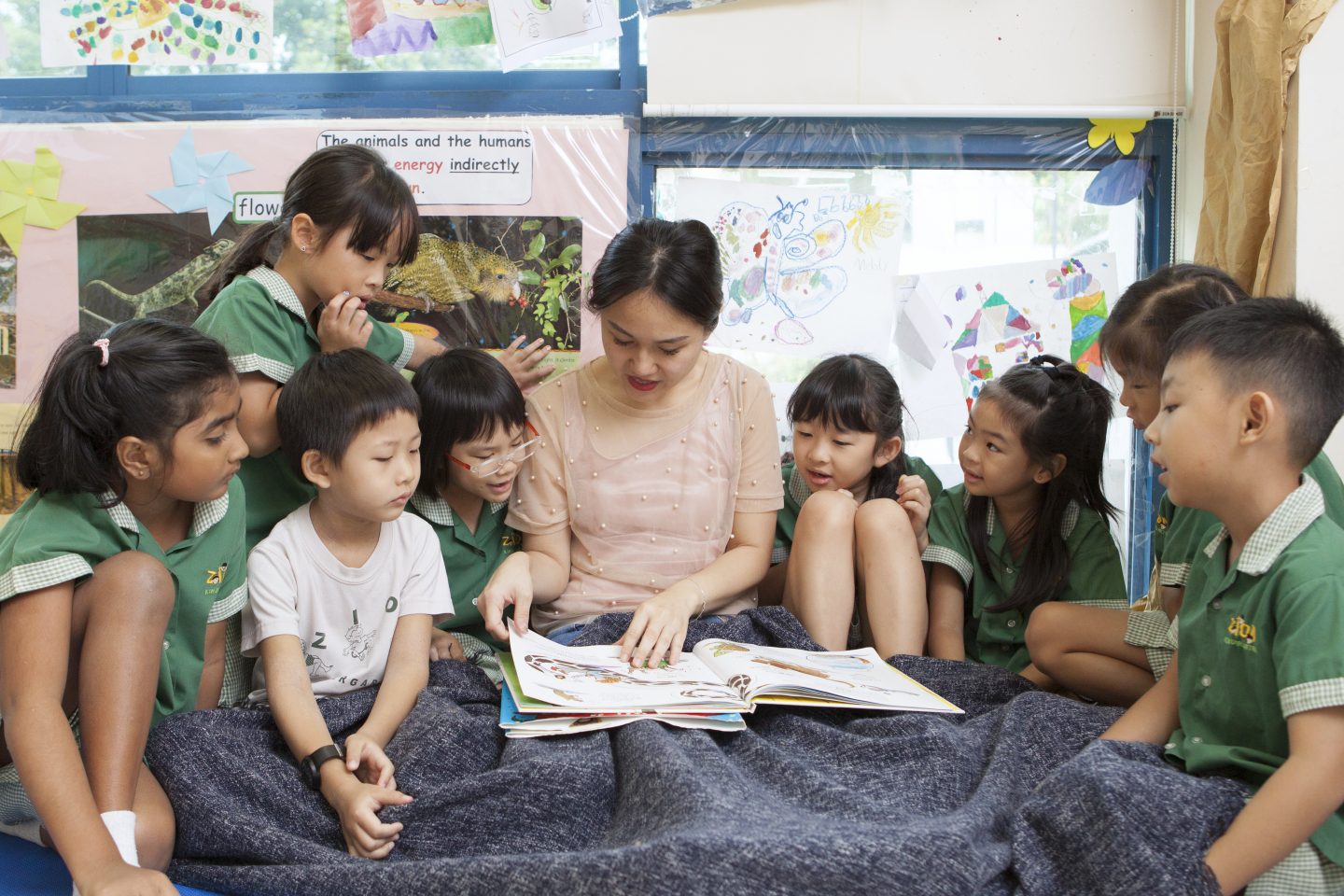
“We come alongside parents in their journey of training children to understand God’s love for them and their place in His kingdom," said Hannah Ong, principal of Zion Kindergarten. Photo courtesy of Zion Kindergarten
“Tomorrow, this apple will turn into an orange.”
Ludicrous as it sounds, it would be considered an indisputable truth if you were a child between the ages of three and six – and your teacher had told you this.
“Not because it makes logical sense, but because there is trust,” says Hannah Ong, principal of Zion Kindergarten in Serangoon Gardens. “The children will believe pretty much anything the teacher says as long as they have a very close bond.”
“I don’t want to talk about it”
In a less amusing situation, Pastor Felicia Goh-Ong, 35, recounted an incident where her firstborn, Ethan, scored zero marks for his spelling test. She’d asked him about the test when he got home from school that day.
Logic and rational thinking only develop later on.
“I don’t want to talk about it,” was the five-year-old’s muted reply.
“I persisted, but he got upset. So I let it go,” she said.
Later, she found out that Ethan’s new teacher had mistakenly tested the class on an entirely new set of spelling words!
It didn’t even occur to Ethan at all that it might not be his fault.
According to experts, the early years of a child are pivotal moments. Between the ages of two and six, astronomical progress is made in a child’s physical, cognitive and socio-emotional skills. Relational attachments take centre stage and cognitive development in those years is largely focused on building up a vocabulary store and communication.
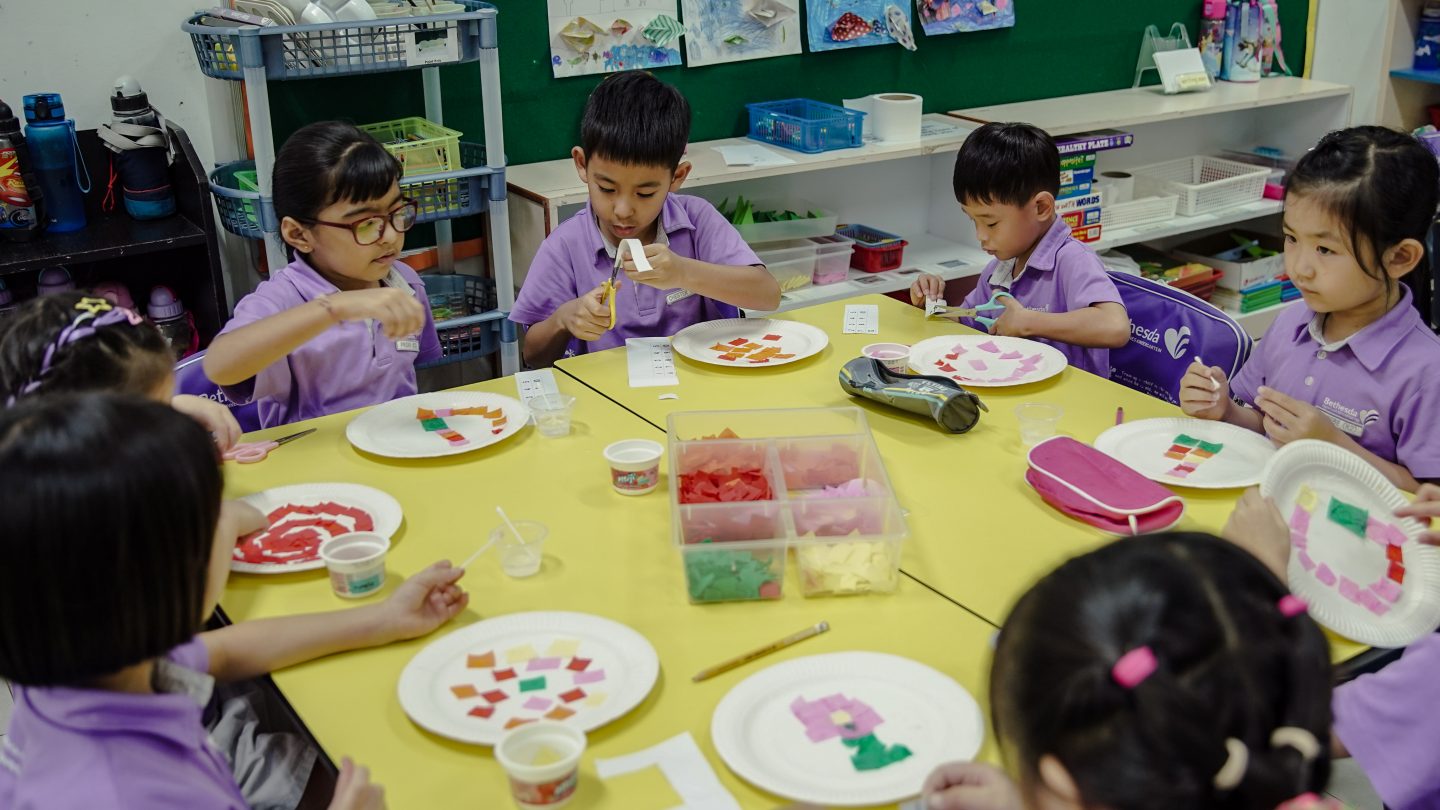
Pre-school education spans the formative years of a child where he or she starts to understand themselves and the world. Photo by Ang Wei Ming.
Logic and rational thinking only develops later on – which explains why apples can turn into oranges, if the right person says so, or why getting zero marks matters more than the unfairness of being tested on unfamiliar words.
A month is all it takes
In Ethan’s previous kindergarten, Pastor Felicia often received feedback from his teachers on how he was “very weak in writing”; she also remembers how he always cried trying to hold a pen and struggled through his spelling tests.
However, his teachers were less forthcoming with concrete suggestions on how to help Ethan – partly because of the high turnover rate in the school. “For three years, every time I asked him what he learnt, or did, he said, ‘nothing’. It was a new teacher a term. No one could really follow through,” she said, admitting that it made her very anxious and stressed.
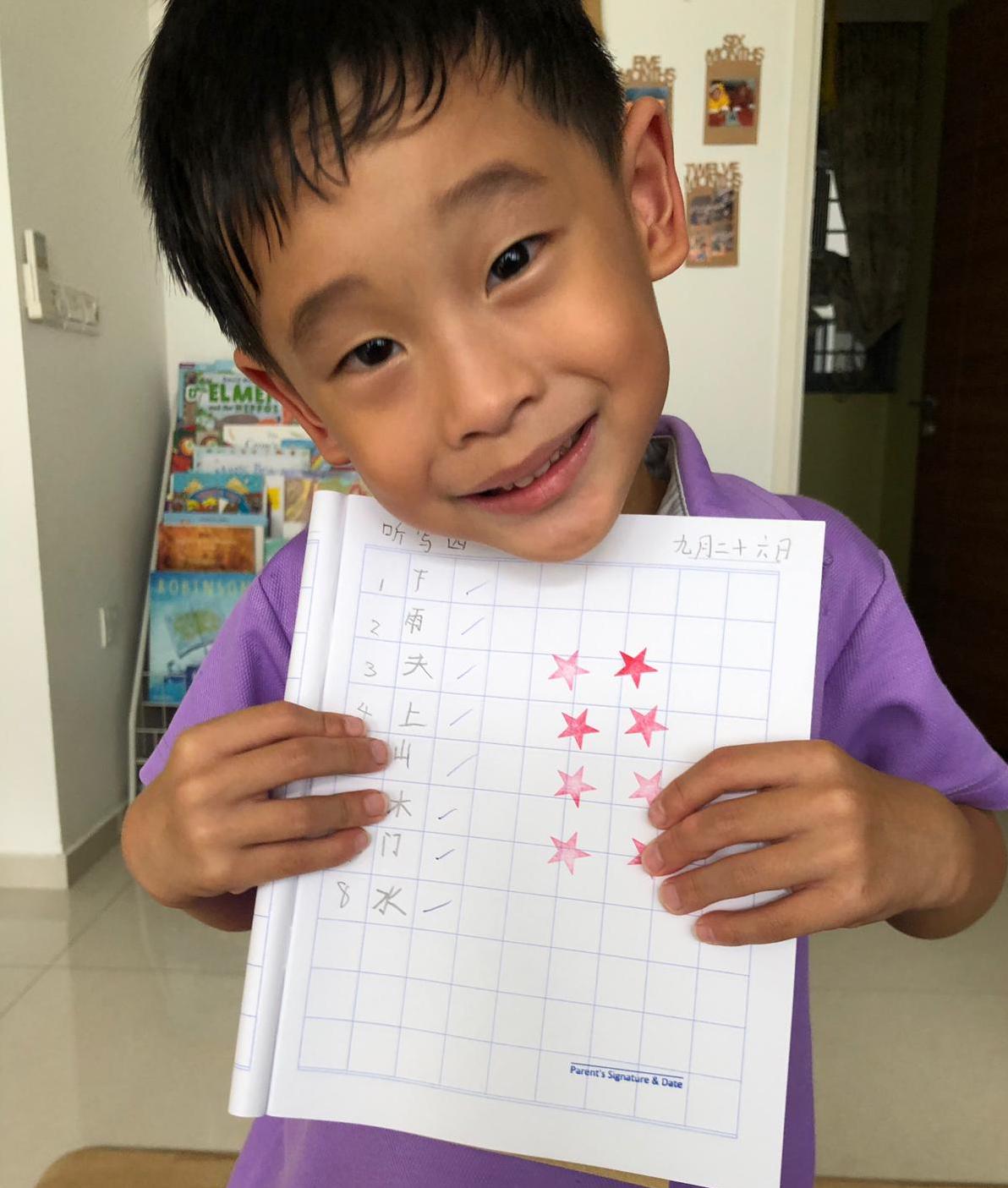
Ethan Ong scored full marks on his latest Chinese spelling test – with “miraculously legible” handwriting, according to Pastor Felicia. Photo courtesy of Ps Felicia Goh-Ong.
“It can be very distressing to a child who isn’t strong academically, but puts in the effort and then finds that he still cannot do it in class.”
Eventually, the decision was made to transfer Ethan to Bethesda Bedok-Tampines Kindergarten (BBTK), an affiliate of Bethesda (Bedok-Tampines) Church, to complete the final year of his kindergarten education there.
Christian teachers who see the kindergarten as their mission field are very intentional.
“When I switched (school), I saw big changes in a month! He would come home and tell me stories and he started wanting to try to read on his own when before that he only wanted me to read.”
At his new school, Pastor Felicia was pleasantly surprised by the experienced teachers who not only gave her feedback on Ethan’s progress, but also provided concrete examples on how to help him along.
Teachers make all the difference, Ong noted, because these are formative years where children start to understand themselves and the world
“They are very easily influenced,” said Ong, adding that what a teacher or role model does is often taken as the golden standard.
Like BBTK, Zion Kindergarten only offers a three-hour programme but, even in those short hours, very close bonds can be formed between teacher and child.
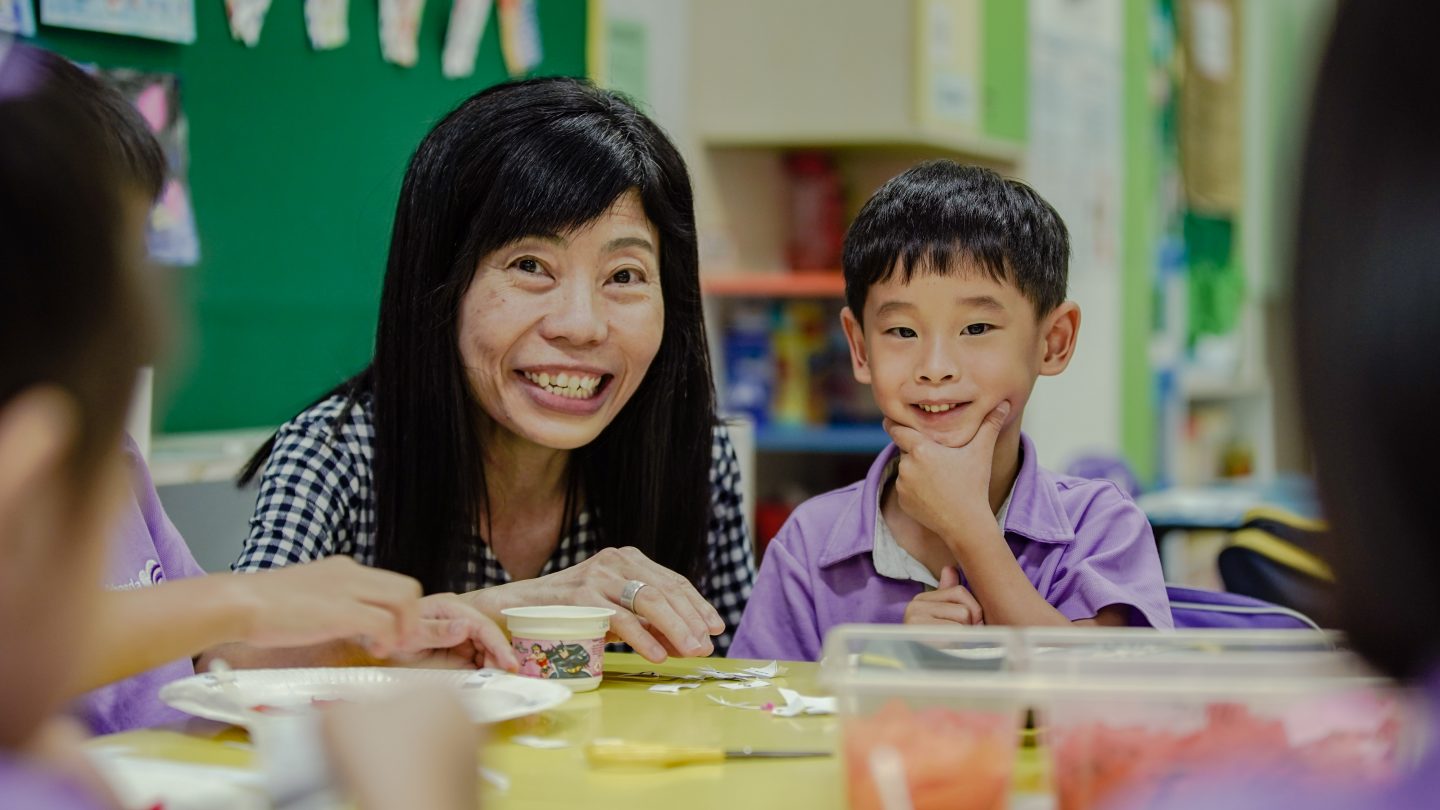
Ethan poses for a photo with Chels Tan, 51, who is the principal of Bethesda (Bedok-Tampines) Kindergarten. Pastor Felicia attributes his drastic academic improvement to the nurturing teachers and environment of the school. Photo by Ang Wei Ming.
And sometimes, they even use the same words in the exact tone that their teachers use, said Ong. “I am often able to make out which class is outside my office just by hearing how the children interact with one another.”
Like-minded Christian teachers who see the kindergarten as their mission field are very intentional, said Ong. “It’s not so much a transaction. How they carry out lessons, it’s a very different vibe. It’s a lot of love. The way they love the children, you really feel God’s love.”
“With faith, your kids have everything”
School is where the child learns to make sense of how to survive in the world while upholding Christian practices and values, said Ong.
She emphasised: “In a world of shifting values and morals, creating a strong moral foundation based on Christian values is essential. Christian parents must have in mind that they are preparing the child not just for primary school, but for eternity.
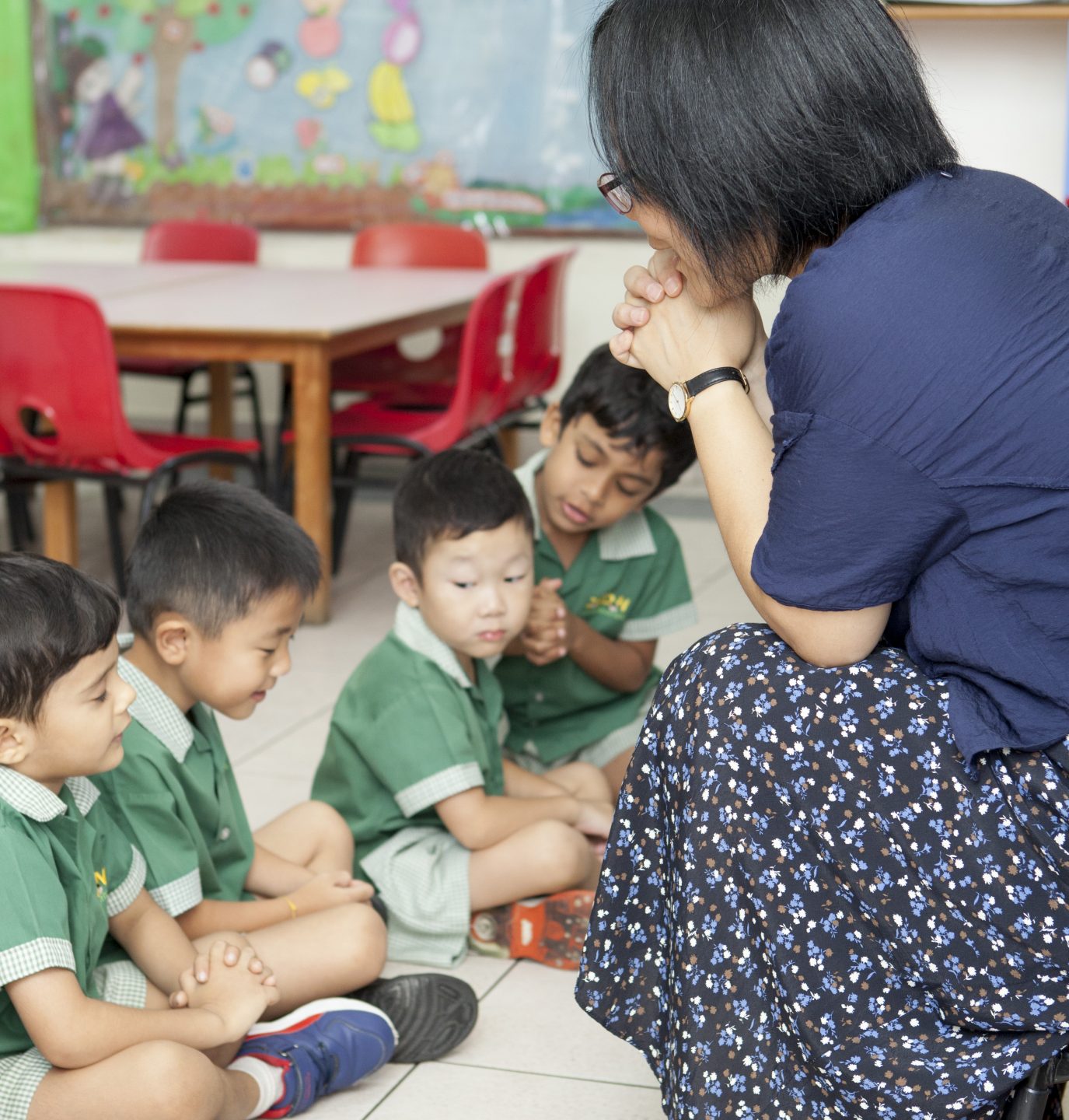
The emphasis on character development and a focus on imparting biblical values alongside the syllabus are some of the main draws of church-based kindergartens. At Zion Kindergarten, for example, not only do children learn Bible stories at assembly, but they also attend programmes that help them apply the truths learnt. Photo courtesy of Zion Kindergarten.
Pastor Felicia, who also has three-year-old twin boys, mentioned similar advice coming from her mentors, who told her: “With faith, your kids have everything. Make sure you get that into them, because God can help them where grades cannot.”
That’s why, to her, academics is not as important as “sowing the seeds of faith”.
“It’s not so much of a transaction. The way they love the children, you really feel God’s love.”
She shared a recent “parenting fail” where she missed the memo about a spelling test that week and didn’t prepare Ethan for it. As expected, Ethan couldn’t do the test but, this time, he apologised to his teacher for not studying on his own. The difference in his attitude towards spelling however, was an encouraging sign.
These ideas of the child in relation to God, the child in relation to his friends and the world are usually taught in a Christian pre-school, Ong said.
“You can equip the child at home, but to practise what they’ve learnt, you need the school too. Home and school are very different settings. Even if parents intentionally disciple their children at home, spending time doing devotions or reading the Bible together, school is a crucial part of the equation.
“We come alongside parents in their journey of training children to understand God’s love for them and their place in His kingdom.
“It is a chance to impact their minds and hearts. And Sunday school is not enough.”
The marks of a good school
When selecting a kindergarten, Pastor Felicia looks out for four things, in order of importance:
- Spiritual environment and climate
- Teachers and their commitment
- Principal/Person in charge
- Physical premises, location and accessibility
Are there teachings about God and Bible stories? What is the teacher turnover rate like? What values does the principal run the school on? For parents to evaluate the suitability of a pre-school, Pastor Felicia suggests speaking to other parents to find out their experiences while Ong recommends that parents observe the teachers on site.
“I wouldn’t conventionally send my child to a school located in the basement!”
“Look at the environment and interactions and see whether the teachers are happy,” said Ong. “If the teachers are happy, the kids will be happy. At the end of the day, I look for the warmth in the teachers, the way they interact with my child, whether they are really genuinely interested in my kids.”
“The most important thing for me is the spiritual climate of the kindergarten,” Pastor Felicia said, adding that attractiveness of the location matters less now.
BBTK is in the church basement, yet it has a long waiting list.
“Ethan’s previous school had a nice physical environment but the teachers were not nurturing,” she explained.
“I wouldn’t conventionally send my child to a school located in the basement! But affirming pastoral environments are great for nurturing children because the spiritual covering and grounding is there.
“This is their introduction to education in Singapore and if it starts badly, it’s not great for the rest of their learning experience.”
We are an independent, non-profit organisation that relies on the generosity of our readers, such as yourself, to continue serving the kingdom. Every dollar donated goes directly back into our editorial coverage.
Would you consider partnering with us in our kingdom work by supporting us financially, either as a one-off donation, or a recurring pledge?
Support Salt&Light


